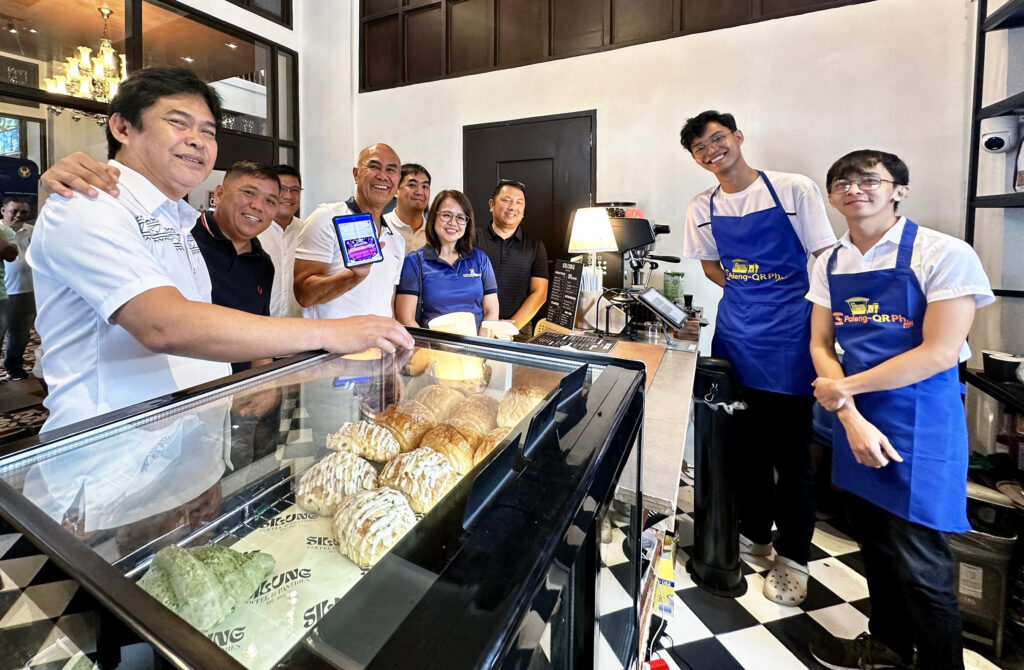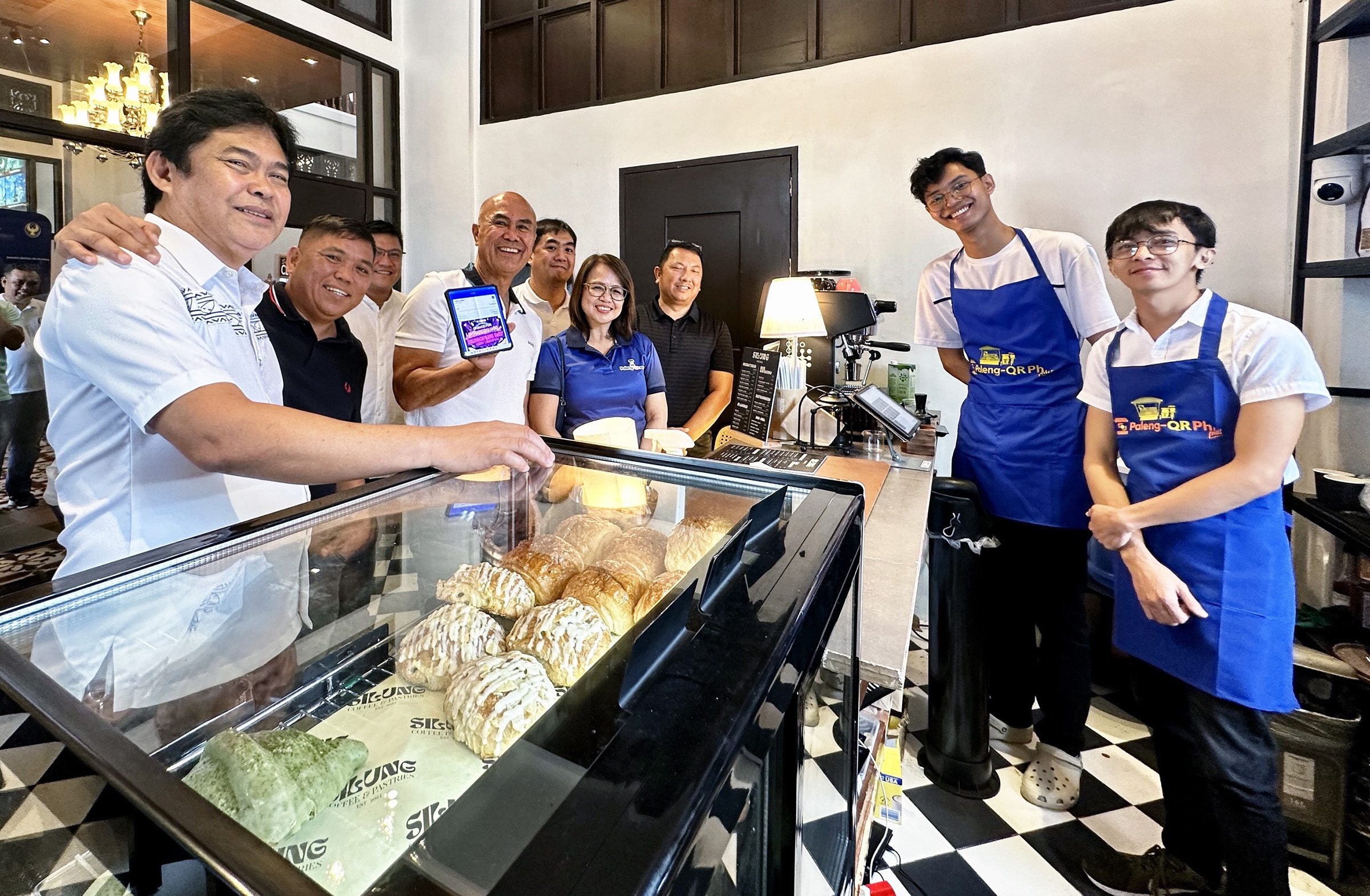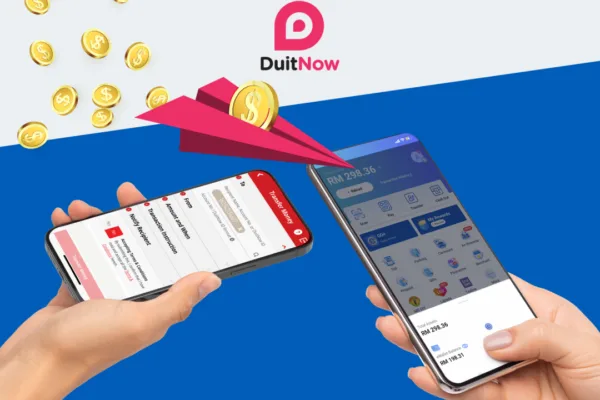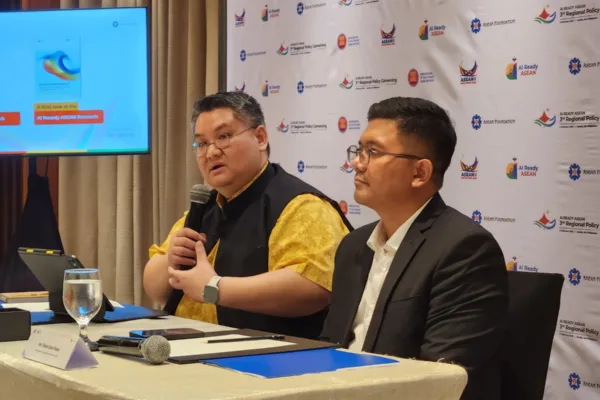On July 23, 2024, a few days before Super Typhoon Carina hit the country, the Bangko Sentral ng Pilipinas (BSP) and the Department of the Interior and Local Government (DILG) took a monumental step towards creating a digital economy by launching the “Paleng-QR Ph Plus” program in Mabalacat City, Pampanga.
The launch event, held in a lively local café, featured BSP Managing Director Rosabel B. Guerrero and Mabalacat City Mayor Crisostomo C. Garbo demonstrating e-payments, showcasing the program’s mission to popularize QR Ph for seamless cashless transactions across various sectors.

Photo shows BSP Managing Director Rosabel B. Guerrero (center) and Mabalacat City Mayor Crisostomo C. Garbo while showing e-payment proof at a café during the launch of Paleng-QR Ph Plus in Mabalacat, Pampanga. Also in the photo were (l-r): City Councilors Noelito Castro and Jerry Magsino, City Tourism Officer Arwin Paul Lingat, BSP Deputy Director Mark Jason Cagalingan, and Market Administrator Ryan Mendiola, as well as two café employees.
In a media advisory, the BSP said the event drew a notable audience, including City Councilors Noelito B. Castro and Jerry P. Magsino, City Tourism Officer Arwin Paul A. Lingat, BSP Deputy Director Mark Jason A. Cagalingan, and Market Administrator Ryan M. Mendiola, along with two café employees.
Their presence underscored the significance of this initiative in fostering the widespread adoption of QR Ph, the national standard for quick response (QR) codes, which enables interoperable and convenient payment transactions.
Earlier this year, the BSP had similarly launched the program in other towns in Pampanga like Guagua and Angeles City to further promote digital payments in public markets, public utility vehicles, and business establishments in the province.
BSP: Transforming the Digital Payments Landscape in PH
Paleng-QR Ph Plus is a strategic initiative by the BSP and DILG aimed at revolutionizing the digital payments ecosystem in the Philippines. By integrating cashless payments into public markets, local transportation — particularly tricycles — and various business establishments, the program seeks to embed digital transactions into the daily lives of Filipinos.
Building on the foundation of the original Paleng-QR Ph initiative, the new program emphasizes the importance of digital payment acceptance among market vendors, community shopkeepers, and tricycle operators and drivers (TODA) nationwide. Encouraging these key participants to adopt cashless payments is essential to making digital transactions a norm for the average Filipino consumer.
From Inspiration to Implementation
The Paleng-QR Ph program originated from the innovative ideas of student policy competition finalists from the University of the Philippines–Los Baños at the 2021 BSP Youth Summit. This concept evolved into a comprehensive program, officially rebranded as Paleng-QR Ph Plus in November 2022.
The “Plus” in the branding signifies the program’s expanded scope, targeting not only market vendors and TODA but also other business establishments within cities and municipalities.
On June 21, 2022, the DILG and BSP solidified their collaboration by signing a joint memorandum circular. This circular outlines the implementation guidelines and defines the roles and responsibilities of various stakeholders, including Local Government Units (LGUs), DILG, BSP, and participating financial service providers (FSPs).
Local Government Units (LGUs) are pivotal to this initiative. They are tasked with issuing policies and ordinances to incentivize or mandate the use of QR Ph digital payments by market vendors, tricycles, and other merchants. Additionally, LGUs are responsible for assisting these users in opening transaction accounts by organizing “account opening days” in collaboration with FSPs.
Participating FSPs are expected to provide customer assistance booths and QR code printouts during these account opening events. Meanwhile, the DILG and BSP are committed to offering technical assistance to LGUs on account onboarding, digital payments, and financial literacy. They also aim to raise public awareness about the Paleng-QR Ph program.
Major components of the BSP’s Paleng-QR Ph program
The key components of the program include:
- Issuance of policies by LGUs to incentivize or mandate the use of QR Ph digital payments by various merchants and transport operators.
- Assistance in onboarding merchants and local transport operators to QR Ph-ready transaction accounts, coordinated by LGUs with FSPs.
- Financial literacy programs conducted by LGUs, BSP, DILG, and participating FSPs, cover topics such as effective use of digital payments in business, financial services for micro and small enterprises, and financial consumer protection.
As of June 30, 2024, 100 LGUs have conducted launch activities or issued policies supporting the Paleng-QR Ph program. This widespread adoption highlights the program’s significant impact and the growing acceptance of digital payments across the Philippines.
With the launch of Paleng-QR Ph Plus, the BSP and DILG are promoting financial inclusion and paving the way for a more efficient and secure payment landscape in the country. This initiative marks a crucial milestone in the Philippines’ journey towards a fully digital economy, benefiting millions of Filipinos through the convenience and security of cashless transactions.








